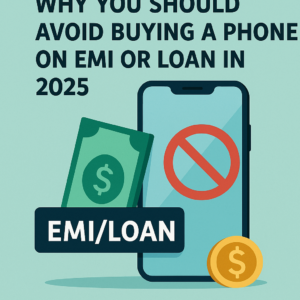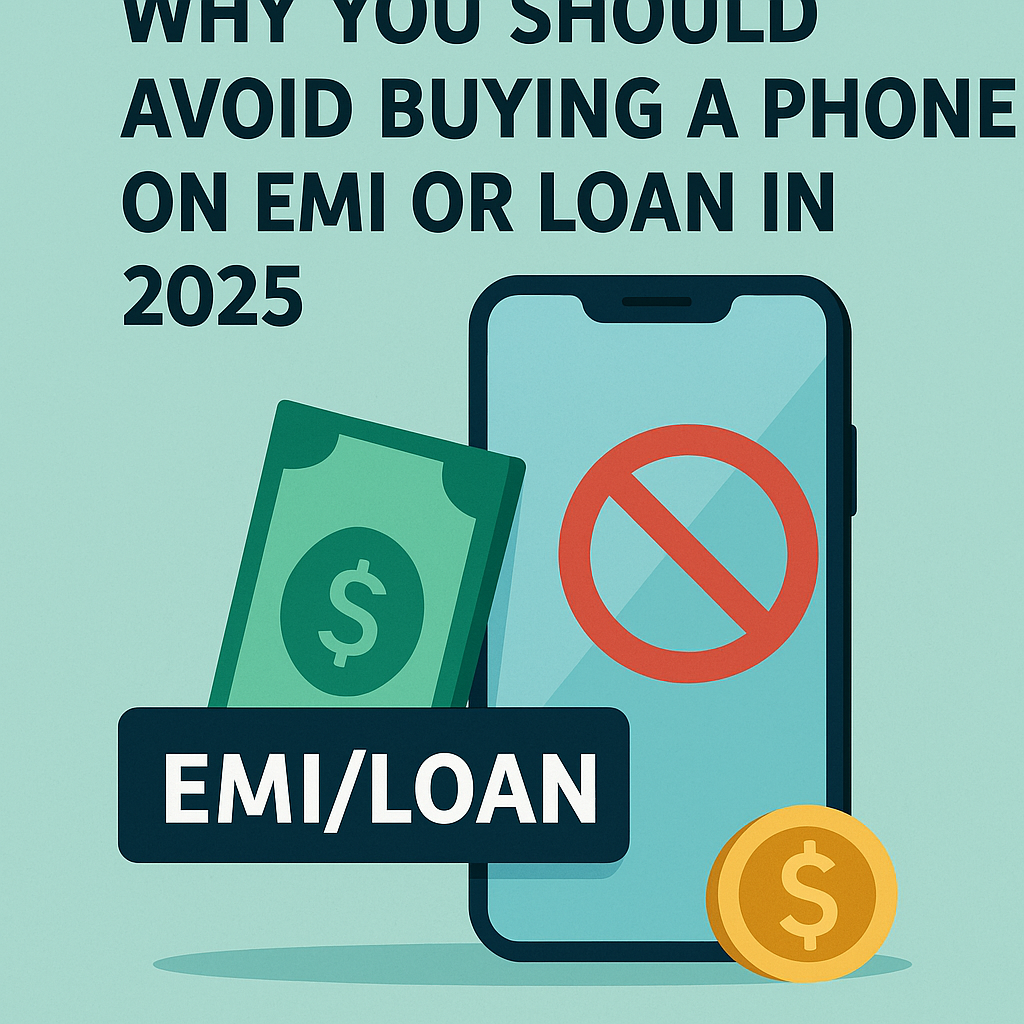Why You Should Avoid Buying a Phone on EMI or Loan in 2025
Why You Should Avoid Buying a Phone on EMI or Loan
In today’s fast-paced digital world, owning a smartphone is no longer a luxury but a necessity. However, with flagship phones becoming more expensive, many consumers turn to Equated Monthly Installments (EMIs) or loans to finance their purchase. While this might seem like a convenient way to own the latest device, it can have several financial downsides. In this blog, we will explore why you should avoid buying a phone on EMI or a loan and make a smarter financial choice instead.
1. Paying More Than the Actual Price
One of the biggest drawbacks of purchasing a phone on EMI or loan is the additional cost incurred through interest rates and processing fees. Many financial institutions and credit card companies charge high interest rates on EMI plans. Even “No-Cost EMI” options often include hidden charges, such as an inflated product price or a processing fee. When you sum up these extra costs, you end up paying significantly more than the actual price of the phone.
For example, if you buy a smartphone worth $1000 on a 12-month EMI plan with an interest rate of 15%, you may end up paying around $1150 or more by the end of the tenure. That’s $150 extra just for the convenience of paying in installments.

2. Financial Burden and Debt Trap
Buying a phone on EMI or a loan adds to your monthly liabilities. If you already have other financial commitments like rent, bills, or existing loans, adding another EMI can put unnecessary strain on your finances. Many people end up taking multiple EMIs, leading to a debt trap where a significant portion of their income goes towards repaying loans.
Additionally, if you miss an EMI payment, you could face hefty penalties and a drop in your credit score, making future borrowing more difficult and expensive.
3. Depreciation and Loss of Value
Smartphones are one of the fastest-depreciating assets. A brand-new phone loses a significant portion of its value within a year. Unlike real estate or investments, smartphones do not appreciate over time. If you purchase a phone on EMI, you might still be paying installments for a device that has already lost a considerable amount of its market value.
Imagine paying EMIs for an iPhone for a year, only to find that a new model has been released, making your phone outdated. You are essentially paying for an asset that is losing its value every day.
4. Psychological Pressure to Upgrade
When you buy a phone on EMI, you lock yourself into a financial commitment for several months. However, the smartphone industry evolves rapidly, with new models launching every few months. This creates psychological pressure to upgrade to the latest model before you’ve even finished paying for your current one.
This cycle leads to a never-ending loop of upgrading, taking new EMIs, and paying more than necessary. Instead of focusing on the real value a phone brings, you may find yourself chasing the latest trend, which is not financially wise.
5. Impact on Credit Score
Your credit score is a crucial factor in determining your financial health. Every EMI or loan you take contributes to your credit history. While timely payments can improve your credit score, missed or delayed payments can have a negative impact. If you struggle to keep up with EMIs, you risk damaging your credit score, making it difficult to secure loans for more important needs, such as a home or car in the future.
A poor credit score can also affect your ability to get credit cards, rental agreements, and even job opportunities in some cases.
6. Encourages Poor Financial Discipline
Using EMI to buy a smartphone can encourage impulsive spending and poor financial discipline. Many people make purchases based on affordability per month rather than the actual price. This mindset can lead to unnecessary spending on luxury items that are beyond one’s financial capacity.
Instead of saving up and making well-thought-out purchases, people tend to buy expensive gadgets impulsively, leading to long-term financial strain.
7. Alternative Smart Buying Strategies
Rather than taking an EMI or loan, consider these smart financial strategies to buy your next smartphone:
a. Save Before You Buy
Create a separate savings fund for your phone purchase. If you set aside a small amount every month, you can buy a phone outright without the burden of EMIs or interest payments.
b. Buy a Previous-Generation Model
Smartphones from the previous generation often offer excellent performance at a significantly lower price. Instead of buying the latest flagship model, consider getting a slightly older model at a discounted rate.
c. Look for Discounts and Exchange Offers
Many online platforms and retail stores offer discounts, cashback deals, and exchange offers. You can trade in your old phone to reduce the cost of the new one.
d. Consider Budget-Friendly Options
Instead of chasing high-end flagship phones, consider mid-range models that offer great value for money. Many mid-range phones provide flagship-level performance at a fraction of the price.
e. Use Zero-Interest Payment Options Wisely
If you must use EMI, ensure that it is a true zero-interest option without hidden charges. Read the terms carefully to avoid paying more than the actual price of the phone.
Conclusion
While buying a phone on EMI or a loan might seem like an easy option, it often leads to unnecessary financial burdens. High interest rates, hidden charges, and the depreciation of smartphones make it a poor financial decision. Instead of opting for EMI, consider saving up, looking for discounts, or choosing a budget-friendly model.
By making a smart financial decision, you can enjoy the benefits of a great smartphone without the stress of ongoing debt. In the long run, financial discipline and careful planning will always lead to a healthier financial future.

